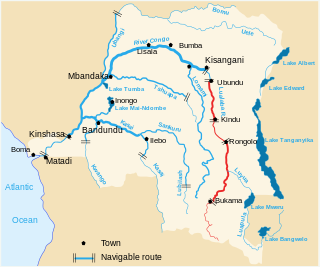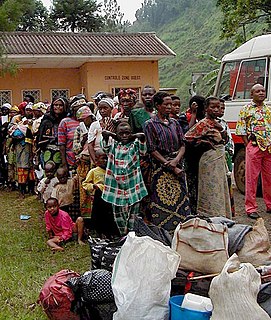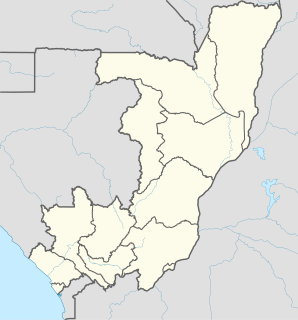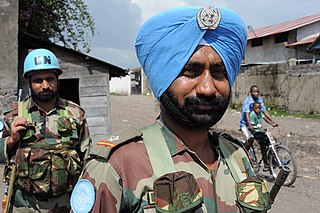
The Democratic Republic of the Congo, also known as DR Congo, the DRC, DROC, Congo-Kinshasa, or simply the Congo, is a country located in Central Africa. It was formerly called Zaire (1971–1997). It is, by area, the largest country in sub-Saharan Africa, the second-largest in all of Africa, and the 11th-largest in the world. With a population of over 84 million, the Democratic Republic of the Congo is the most populous officially Francophone country, the fourth-most-populous country in Africa, and the 16th-most-populous country in the world. Eastern DR Congo has been the scene of ongoing military conflict in Kivu, since 2015.

Coltan is a dull black metallic ore from which are extracted the elements niobium and tantalum. The niobium-dominant mineral in coltan is columbite, and the tantalum-dominant mineral is tantalite.

The Lualaba River flows entirely within the eastern Democratic Republic of the Congo. It is the greatest river source (headstream) of the Congo River by volume of water. The Lualaba is 1,800 kilometres (1,100 mi) long. Its headwaters are in the country's far southeastern corner near Musofi and Lubumbashi in Katanga Province, next to Zambia. The Chambeshi River is the longest river source (headstream) of the Congo.

The Second Congo War began in the Democratic Republic of the Congo in August 1998, little more than a year after the First Congo War, and involved some of the same issues. The war officially ended in July 2003, when the Transitional Government of the Democratic Republic of the Congo took power. Although a peace agreement was signed in 2002, violence has continued in many regions of the country, especially in the east. Hostilities have continued since the ongoing Lord's Resistance Army insurgency, and the Kivu and Ituri conflicts.

The United Nations Organization Stabilization Mission in the Democratic Republic of the Congo or MONUSCO, an acronym based on its French name, is a United Nations peacekeeping force in the Democratic Republic of the Congo (DRC) which was established by the United Nations Security Council in resolutions 1279 (1999) and 1291 (2000) of the United Nations Security Council to monitor the peace process of the Second Congo War, though much of its focus subsequently turned to the Ituri conflict, the Kivu conflict and the Dongo conflict. The mission was known as the United Nations Mission in the Democratic Republic of Congo or MONUC, an acronym of its French name Mission de l'Organisation des Nations Unies en République démocratique du Congo, until 2010.
Congolese Civil War or Congo War may refer to any of a number of armed conflicts in present-day countries of Republic of the Congo and the Democratic Republic of the Congo in Western Africa:

Masisi Territory is a territory located within the North Kivu Province of the Democratic Republic of the Congo. Its political headquarters are located in the town of Masisi. Masisi Territory has constantly been subjected to the conflict between the Congolese army and militias, which has plagued the eastern Congo since the ending of the Second Congo War. Hutu and Tutsi militias originating from the Rwandan genocide and the Congolese civil war, and Mai-Mai groups, are involved in these episodes of conflict, which also relates to Rwandan border security and the control of eastern Congo's minerals by rebel groups and business interests. Armed groups have systematically targeted the civilian population.
The Dongo conflict was a minor conflict centered in the town of Dongo, on the left bank of the Ubangi River in Sud-Ubangi District, Democratic Republic of the Congo. Violence initially broke out in late October 2009 after a local dispute over fishing rights. This destabilised the region and led to a spiral of violence, and an exodus of civilians attempting to flee from the fighting. By December 2009, more than 168,000 people had fled their homes, many of them crossing into the neighbouring Republic of the Congo. An intervention by the Congolese army and United Nations Mission in the Democratic Republic of Congo (MONUC) brought to conflict to an end by 13 December 2009.

Bétou is a town on the right bank of the Ubangi River in the Likouala Department, Republic of the Congo. Bétou is a "sous-prefecture" and has its own mayor. It is the border town with the Central African Republic (CAR), approximately 90 km (56 mi) from the border by road or 45 km (28 mi) by river. The town is linked to Bangui, the capital of CAR, by a relatively good road but suffers from very poor road access to the south of the Republic of Congo, with the vast majority of travelers arriving by river. The town has a disused air-strip.
The Resistance Patriots of Dongo was a possible rebel group in the Democratic Republic of the Congo during the Dongo conflict. Its existence is disputed.

United Nations Security Council Resolution 1906, adopted unanimously on December 23, 2009, after reaffirming previous resolutions on the topic and noting the situation in the Democratic Republic of the Congo, the Council decided to extend the mandate of the United Nations Mission in the Democratic Republic of Congo (MONUC) until 31 May 2010. The resolution therefore allowed 21,000 police and domestic and international troops to remain the country.

United Nations Security Council Resolution 1925, adopted unanimously on May 28, 2010, after reaffirming previous resolutions on the situation in the Democratic Republic of the Congo, the Council extended the mandate of the United Nations Mission in the Democratic Republic of Congo (MONUC) until June 30, 2010, authorised a withdrawal of 2,000 troops and decided that from July 1, 2010, MONUC would be known as the United Nations Organization Stabilization Mission in the Democratic Republic of the Congo (MONUSCO) with a mandate until June 30, 2011.

United Nations Security Council resolution 1445 was adopted unanimously on 4 December 2002. After recalling all previous resolutions on situation in the Democratic Republic of the Congo, the Council expanded the military component of the United Nations Mission in the Democratic Republic of Congo (MONUC) to a level of 8,700 military personnel–up from 4,250–in two task forces.

United Nations Security Council resolution 1489, adopted unanimously on 26 June 2003, after recalling Resolution 1291 (2000) and other resolutions on the situation in the Democratic Republic of the Congo, particularly resolutions 1468 (2003) and 1484 (2003), the Council extended the mandate of the United Nations Mission in the Democratic Republic of Congo (MONUC) until 30 July 2003.

United Nations Security Council Resolution 1952, adopted unanimously on November 29, 2010, after recalling previous resolutions on the situation in the Democratic Republic of the Congo, including resolutions 1807 (2008), 1857 (2008) and 1896 (2009), the Council renewed an arms embargo and related targeted sanctions for a further period until November 30, 2011.

United Nations Security Council Resolution 1991, adopted unanimously on June 28, 2011, after reaffirming previous resolutions on the situation in the Democratic Republic of the Congo, the Council extended the mandate of the United Nations Organization Stabilization Mission in the Democratic Republic of the Congo (MONUSCO) until June 30, 2012.
Dongo is a Ubangian language spoken in DRC Congo.
Bomboli is a Bantu language of the Democratic Republic of the Congo. The language is spoken in the towns of Kungu and Dongo in the Sud-Ubangi province, specifically on a canal flowing into Ngiri river, north of Bomongo.












